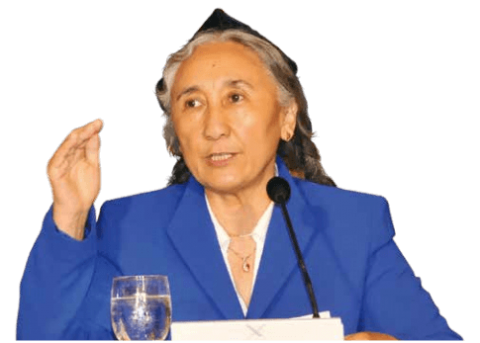Issue:
EXILED BY CHINA, SHUNNED BY OTHER GOVERNMENTS, LEADER OF UYGUR INDEPENDENCE MOVEMENT STRUGGLES ON
Uyghurs fight for independence
by Julian Ryall
Amere 8.4 million strong, the Uyghur people live in northwest China in what the government terms the Xinjiang Autonomous Region. They are vastly out numbered by their overlords; and when the Chinese military comes with semiautomatic weapons and hand grenades, they are only able to defend themselves with kitchen implements.
Rebiya Kadeer, the exiled president of the World Uyghur Congress, says she and her people have overcome difficulties in the past. And she believes that growing discontent throughout Chinese society for economic, social, political and human rights reasons could help the Uyghur people achieve their aim of independence.
“If you look inside China, it is clear that the people have lost confidence in the government. They don’t believe what they are being told,” 66 year old Kadeer said at a recent press conference at the Club.
It has been a long campaign for Kadeer, and one that shows no signs of ending soon. Born in poverty in the city of Altay, she built her own laundry business and rose to become one of the five richest people in China. Then she was arrested on suspicion of supporting the independence movement for the Uyghur people.
Tried and found guilty of leaking state secrets in 2000, her case caused international outrage; she was released on medical grounds in 2005 and permitted to settle in the United States.
Today, she hopes that internal dissent coupled with international pressure might just be enough to encourage China to consider granting self determination to the Uyghur people. Unfortunately, she was not going to be able to meet with any representatives of the Japanese government on her latest trip to Tokyo apparently everyone was too busy in the run up to the July election.
She expressed no disappointment, saying instead that the trip was still giving her a chance to inform ordinary Japanese people of her struggle. But she was critical of countries that she had expected more of.
“I have provided information to other Islamic nations and organizations about how religious schools are being closed by the Chinese authorities, about how their teachers and students are being arrested and imprisoned,” she said. “Korans are being burned and schools forced to shut. I have told them how during the holy month of Ramadan, Chinese soldiers are going into Uyghur homes and forcing people to drink alcohol and eat.
“I want other Islamic groups and nations to extend support to us, but so far they have not helped us,” she said. “More than 60 countries from around the world signed a document condemning the Burmese government’s treatment of its Muslim minority, while in our country there are more than 10,000 dead and another 10,000 are missing.”
Beijing has circulated a list to other governments of 22 senior Uyghur leaders that it has branded as terrorists. Fearful of being labeled as supporters of extremists in the ongoing war on Islamic terrorism, Arab nations have capitulated and are refusing to allow Kadeer and other members of the World Uyghur Congress to visit, she said.
Any hopes that the situation for minorities might improve under the leadership of new Chinese President Xi Jinping have also been dashed. “Since the government of Xi started, policies on ethnic minorities have become tougher than ever before,” she said. “China has many domestic problems that are becoming very serious, so they have to show the rest of the people that the government is still powerful.”
Kadeer also dismissed allegations by the Chinese government that there has been an upsurge in Islamic fundamentalism in Uyghur regions. “This land belongs to the Uyghur people, and the people believe in Islam,” she said with a shrug. “We pray and we follow the rules of Islam; we fast during Ramadan. Even if Chinese policy is against us, we will follow our traditions. We are simply following Islamic rules.”

Kadeer says her organization’s demands of Beijing are simple: the right to self determination.“We have suffered under the Chinese government and it is important that we achieve independence under international law and through self determination,” she said. “If China wants to talk peacefully with us, then we can do that in a way that both sides can understand. Then we could live in a peaceful society with all the other ethnic groups.”
That would include the millions of Han Chinese who have been encouraged by the central government to settle in traditional Uyghur areas and who now vastly outnumber the original inhabitants of the region.
But until then Kadeer insists the Uygur people will continue their campaign for independence. “We will fight until the Chinese government understands that we want self determination,” she added. “And then we can talk. We want a peaceful, just society because we have suffered for too long under the Chinese Communist Party.”
Julian Ryall is Japan correspondent for The Daily Telegraph.

